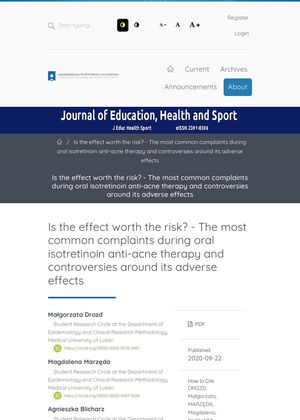Is the Effect Worth the Risk? The Most Common Complaints During Oral Isotretinoin Anti-Acne Therapy and Controversies Around Its Adverse Effects
September 2020
in “
Journal of Education, Health and Sport
”

TLDR Most patients on isotretinoin for acne experience mild, dose-related side effects, but the connection to depression or bowel disease is uncertain.
The study conducted by Małgorzata Drozd and colleagues in 2020 aimed to evaluate the prevalence of adverse effects in patients treated with isotretinoin, a vitamin A-derivative used for acne vulgaris treatment. The study involved a survey of 196 Polish patients who had been treated with isotretinoin. The most common side effects reported were mucocutaneous effects such as dry lip (92.6%), dryness of the mucous membranes (73.5%), xerodermia (66.8%), and dryness of the conjunctiva (66.3%). Other reported side effects included tiredness and back pain (70.4%), myalgia (55.1%), arthralgia (32.1%), stiffness of joints (26.0%), mood change (54.6%), hair loss (50.0%), and gastrointestinal symptoms (15.8% - 10.7%). The study concluded that while these side effects were usually mild and dose-dependent, their prevalence was very high. The link between isotretinoin and depression or suicidality remained unclear, and the risk of inflammatory bowel disease was probably not increased in patients exposed to isotretinoin. However, the authors suggested that more studies were necessary.




